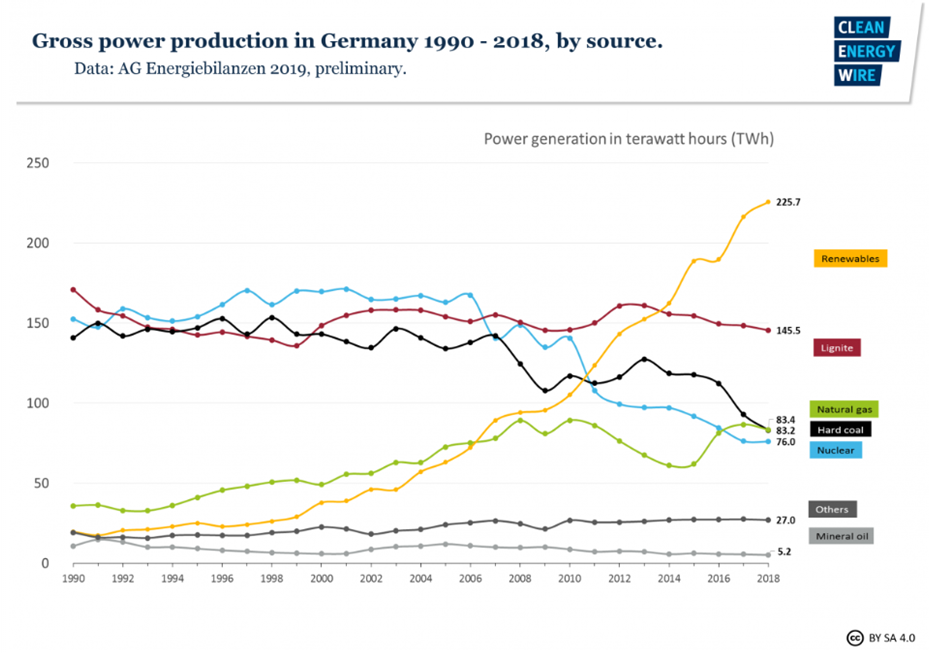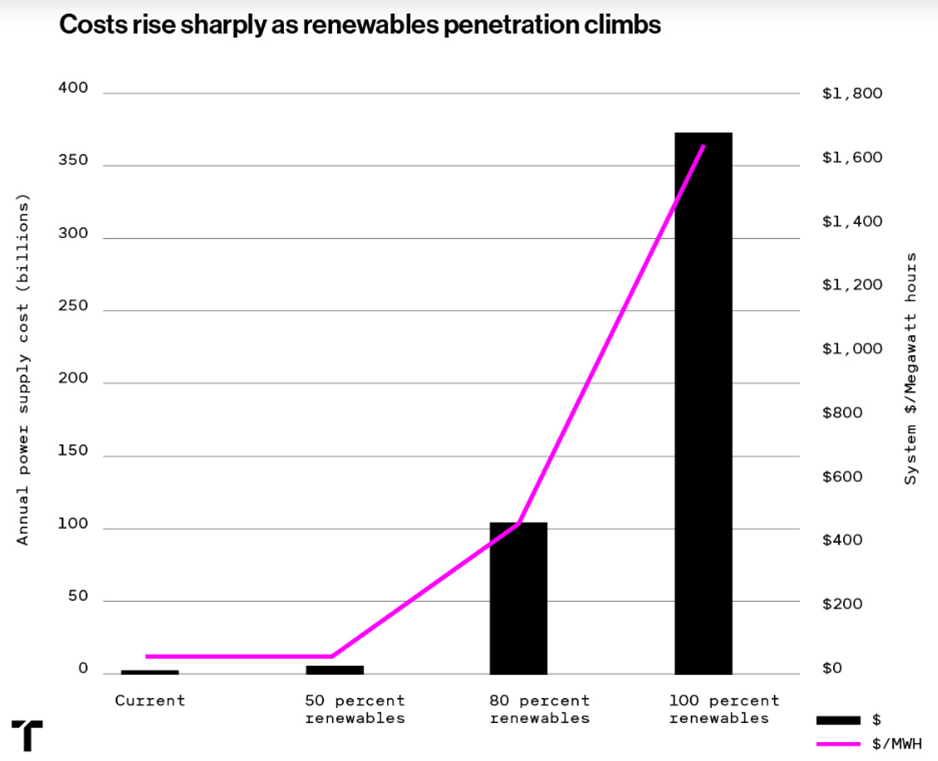Nobody Gives a Damn About Climate
teoct
Publish date: Thu, 08 Aug 2019, 02:49 PM
Nobody Gives a Damn About Climate
On self-absorption of environmentalism
Michael Petraeus – July 22, 2019
https://criticalspectator.com/environment/nobody-gives-a-damn-about-climate
You would be hard-pressed to find a day when another apocalyptic piece of news about the state of our planet doesn’t hit the headlines. The narrative of impending doom is gushing out from every corner of the web, every newspaper, every TV channel.
And yet, I can’t easily dismiss the observation that the supposed solutions, which are being touted as remedies for the apparent horrors that lay ahead are grossly – and strangely – inadequate.
In other words – none of what we’re being told is supposed to solve the issues appears to be even remotely rational. And that, in turn, undermines the entire narrative of environmentalism. If the situation is really so bad and we must undertake dramatic efforts to save the planet and ourselves, why are some of the best solutions available to us so easily dismissed by the same people who claim to represent scientific views on the matter?
Irrelevance of Climate Change
I’m not a climate expert by any stretch of imagination and I’m not here to discuss what and why is happening. Partly because tenured researchers around the world are paid enough to provide explanations and possible future scenarios – and partly because it doesn’t really matter.
Our forecasting capabilities – in any domain of life – are greatly flawed (to say the least). We can’t reliably predict the next economic downturn, results of the next football match or the weather next Tuesday. But we do know for sure anything that we can accurately measure using scientific instruments. On this basis, we know that average global temperatures are rising, because we track them over time.
Looking into our future it is of secondary importance “why” it happens. Of course it would be great to know with absolute certainty (so we can gain more direct control over it) but as we are facing possible consequences, mitigating them is our primary objective.
If the temperatures are going up and the poles indeed do melt and we all get flooded, does it really matter whether it’s because we’re burning too much coal or that simply such is the nature of a warm interglacial period?
Currently accepted explanation is that the main culprit is CO2 emitted by humanity. Many skeptics will protest that a gas which forms merely 0.04% of Earth’s atmosphere – with a human contribution to annual emissions at paltry 5% (with 95% coming from natural sources) – surely cannot be the reason of a planetary apocalypse. But, again, even if they turned out to be right, it doesn’t matter. Why? Because we have to move on from using fossil fuels to power the world anyway.
If not to reduce the CO2 output then to eliminate countless other harmful emissions that contribute to pollution and smog which kill millions of people every year. I think we can all agree on this one.
The biggest problem in climate drama is not the disagreement about causes but the disagreement on solutions.
We need better energy sources than burning things we dig out of the ground. Given more than a century of experience with electricity generation, we also know what the properties of an ideal energy source are – cheap, abundant, offering stable delivery (with a degree of flexibility to manage supply and demand), reliability of operation, its longevity and environmental cleanliness.
There’s only one source that fulfills those criteria today – nuclear fission.
And this is where widespread irrationality begins to manifest itself.
All the people supposedly dedicated to saving the planet are dismissing evidence telling us that for humanity to abandon fossil fuels and still provide for its needs, it has to employ nuclear power. Of course, you may be convinced that nuclear power is not worth the risk, that technology is progressing all the time and that soon enough we will be able to power the planet using safe and clean renewable energy sources.
The problem is that the math doesn’t check out.
Facts
Despite serious efforts, humanity is currently burning more fossil fuels per year than ever before. In fact, their consumption is expected to grow by another 20% by year 2040.
In other words, our appetite for coal and gas is not going down – it’s going up – regardless of all the media buzz and celebration of every solar panel and windmill installed.
Even Germany, praised as the paragon of good progress, is actually building new coal power plants and coal mines as I write this article.
After spending hundreds of billions of euros in investments and subsidies (up to a target of 500 billion euros by 2025), Germany is still set to miss its goals for emissions reduction.
In fact, despite the horrendous expenses, Germany’s CO2 emissions have stayed largely the same in the past 10 years, while electricity prices have increased by 50% since 2006 – mainly due to increases in environmental surcharges that shift the costs of investments onto the consumers.
At the same time, the main victim of Germany’s energy policy has been nuclear power, with its share in national power production dropping by 50% in recent years, gradually replaced not only by supposedly clean solar and wind power, but also by gas and lignite.

In spite of all these sacrifices, Germany is still the largest CO2 polluter in Europe and releases nearly twice as much carbon dioxide as neighboring France – which relies for close to 75% of its energy needs on nuclear power – with the rest provided by renewable hydro / wind / solar sources. Share of fossil fuels in the mix is below 10% there.
And yet, despite all of these achievements it’s not France, but Germany, that is being held up as an example.
Let’s summarize this madness – we’re told that our role model should be a country which spends inordinate amounts of money with very limited reduction in CO2 emissions, while drastically elevating electricity prices and adding new coal power plants to keep itself from plunging into darkness. How exactly is this considered “progress”?
Nobody who seriously believes in reducing carbon dioxide emissions can possibly consider German experiences to be a success. Still, you may feel inclined to think that these are just teething problems, that early adopters always stumble and pay the higher price, but when technology matures it will all be well.
It won’t.
Renewables Keep Fossil Fuels Alive
I could go on about how solar and wind power plants impact the environment, that they take up enormous amount of space that either needs to be cleared of wildlife (even in the deserts) or interferes with it (by killing millions of large birds – many of them endangered). At the end of the day arguments could still be made that other energy sources cause significant damage as well.
There is, however, one characteristic of renewable power sources that cannot be easily dismissed or mitigated – and which calls into question rationality of the entire concept.
They do not produce electricity in a stable, reliable manner – and when they fail to deliver (e.g. in the evenings, when there’s no sun) other sources have to kick in. It so happens that these sources have to be fossil fuels.
These peaking power plants – mainly utilizing natural gas – are built for the sole purpose of filling the gaps in supply – albeit it at a much higher cost.
As a result, the current modus operandi is to build new fossil fuel plants to help “keep the lights on”, as the German energy secretary put it last year, when the government faced protests over cutting a forest to build a new coal mine (yes, you read that right).
Notably, the role of a peaker cannot be served by nuclear plants since they are not suited for flexible operation that can rapidly add or reduce the power output to match changing demand. They are designed for continuous, efficient operation 24/7/365.
In essence – using wind and solar power supports future demand for fossil fuels.
Some of you may protest at this point – “wait a minute, what about batteries which can store excess electricity and later distribute it when it’s needed?”.
The problem with that idea is that the more solar and wind farms you build, the greater the capacity of power storage has to be in order to handle extreme peaks in supply without frying the entire electric grid.
This is especially pronounced with seasonal peaks in production – e.g. solar power in the summer. Batteries work decently well in handling daily fluctuations, which require relatively small storage facilities. But gathering excess electricity to power the country for months would require enormous facilities which would cost hundreds of billions if not trillions of dollars – as detailed in this article from MIT Technology Review.
“Building the level of renewable generation and storage necessary to reach [California’s] goals would drive up costs exponentially, from $49 per megawatt-hour of generation at 50 percent to $1,612 at 100 percent. And that’s assuming lithium-ion batteries will cost roughly a third what they do now.“

And I haven’t even touched on other issues – like the fact that lifespan of turbines and solar panels is only 20-25 years – with their efficiency decreasing over time by as much as 50%. Or that discarded equipment – especially the panels – are going to cause a recycling disaster by mid-century, rising from current 250,000 tons globally to nearly 80,000,000 tons by 2050.
Simply put, renewables are unlikely to cover 100% of our energy needs. Ever.
We may dream that, in some distant future, when we invent new types of batteries that are cheap and endlessly reusable, perhaps we would be able to store electricity for months or years on end and use it as we please.
But to impact the climate we need to take action today not in 50 years time – and the technology that allows us to draw power from renewable sources is simply not enough. It means that the missing chunk has to be generated elsewhere.
Since we should not rely on fossil fuels then the only option left is nuclear.
But if we need to use nuclear power anyway, then why not use it for all of our needs? Why go through enormous complexity of an unreliable system based on solar panels and windmills when we can simply build more reactors which generate power all the time, without crazy surges and drops?
And yet, try having a conversation about nuclear power with self-professed environmentalists and you’re likely to end up a victim of an assault. Activists have already led to vilification and complete destruction of German nuclear sector – yet somehow it doesn’t seem to bother them that resulted in higher carbon dioxide emissions.
So is it really about climate? If even eco-activists are blindly ignorant (or, perhaps, deliberately manipulative) then why should the rest of us be bothered?
Nobody Really Cares
And this phenomenon, this widespread anti-nuclear hysteria actually reveals the true nature of environmentalism. It’s not really about the the planet – it’s about the egos (and perhaps economic interests) of all the participants.

The same shallow, egotistic behavior is what drives other bouts of virtue signalling, like the bans on plastic straws – which have minuscule share in general plastic waste but it’s enough for millions of people to feel like they’re doing something – without actually doing anything.
Climate change isn’t really treated like an issue that requires rational scientific and engineering solutions, but a fashionable trend.
We’ve commercialized it to serve our self-image. In democratic countries, this trend is driving political decisions, regardless of how sane they are. As a result billions of dollars and euros are being blindly pumped into renewable technologies simply because it helps score political points, rather than solve real problems – especially as nuclear power suffers bad press.
Since politicians are not spending their own money, they’re only too happy to oblige and dump the tax proceeds into yet another wind or solar farm – and then shift the added burden back on the users via another price hike.
But people will gobble it up as they believe they are helping the planet, so sacrifices may be necessary in order to save it, rather than examine and support technologies that would solve the issue of CO2 generated in the process of electricity production forever. Technologies we possess and have decades of experience in using.
Alas, being pro-nuclear isn’t cool, regardless of how much it would help the environment. You can’t put it on a canvas bag and pretend you’re a kind-hearted, animal loving hippie because reliance on uranium instead of wind and sun rays just doesn’t provide that much social currency.
More articles on TeoCT
Created by teoct | Jul 23, 2020





















